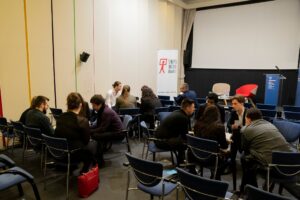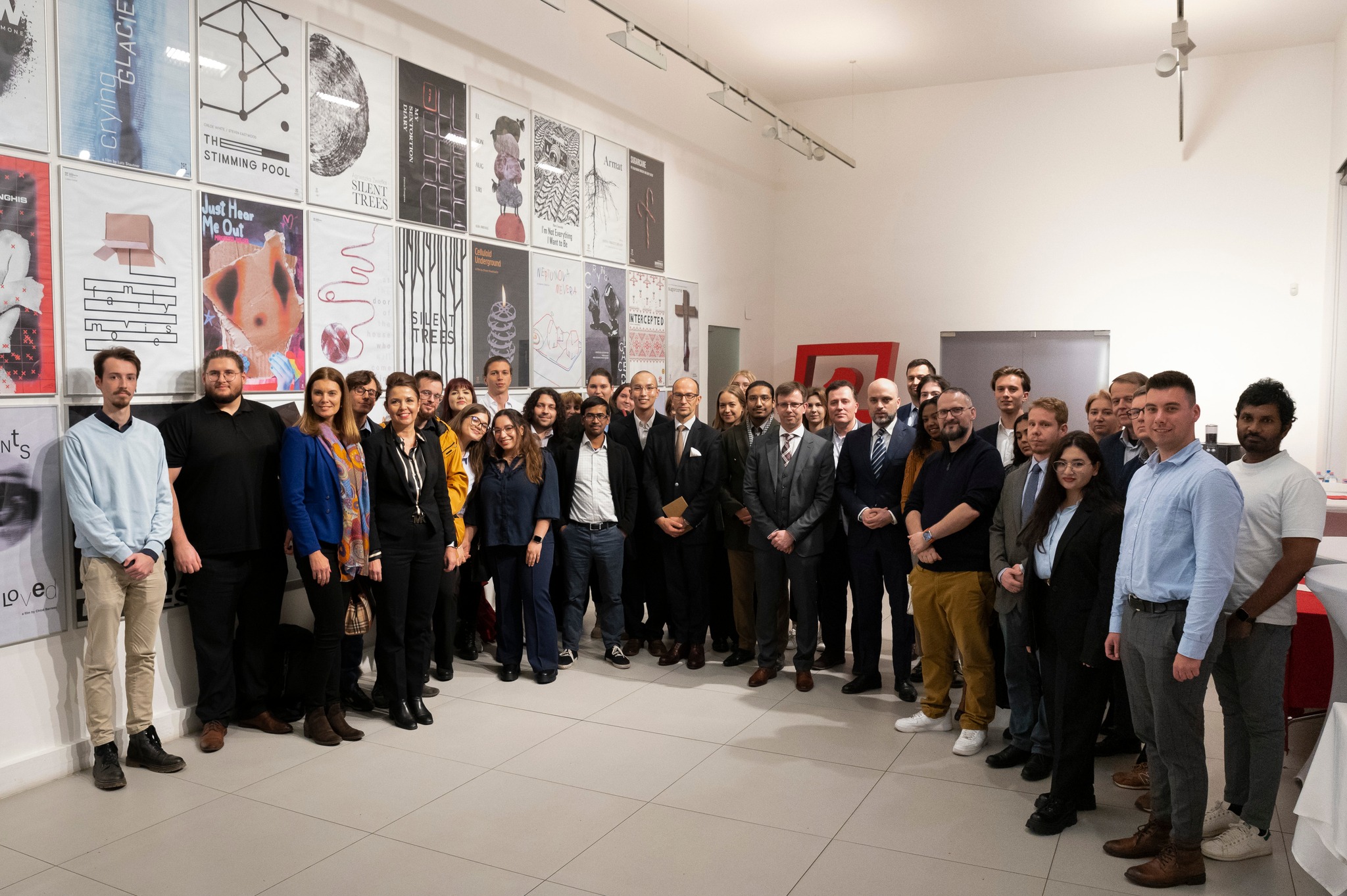
20 Dec Summary of the 1st Polish-Hungarian Congress on EU Studies
The Polish-Hungarian Congress o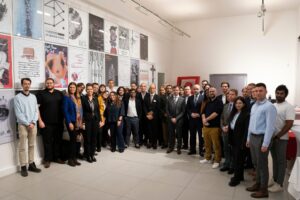 n European Studies was organised in Budapest on the 28-29 November, 2024 to bring together students and academics from the two countries to share their experiences of teaching EU Studies and the challenges that are currently at the focus of EU debates. The event was inspired by the Hungarian and Polish Presidencies of the Council of the European Union in 2024 and 2025, respectively. During the discussions, the priorities of the Presidencies were compared and common and divergent Polish and Hungarian interests were identified.
n European Studies was organised in Budapest on the 28-29 November, 2024 to bring together students and academics from the two countries to share their experiences of teaching EU Studies and the challenges that are currently at the focus of EU debates. The event was inspired by the Hungarian and Polish Presidencies of the Council of the European Union in 2024 and 2025, respectively. During the discussions, the priorities of the Presidencies were compared and common and divergent Polish and Hungarian interests were identified.
Opening Remarks by Ambassador Sebastian Keciek
Ambassador Keciek highlighted the transition from Hungary’s EU Presidency to the beginning of the Polish Presidency. He noted the importance of shared foreign policy goals, focus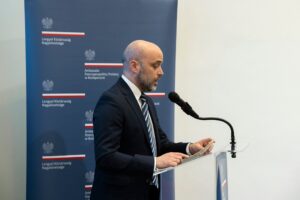 ing on critical issues such as the war in Ukraine, rising tensions in the Middle East, migration, and economic development. He emphasized the pivotal nature of enlargement, financial stability, and competitiveness as key EU priorities. While the Presidency should act as an “honest broker”, it can influence how the EU tackles these challenges by shaping the agenda.
ing on critical issues such as the war in Ukraine, rising tensions in the Middle East, migration, and economic development. He emphasized the pivotal nature of enlargement, financial stability, and competitiveness as key EU priorities. While the Presidency should act as an “honest broker”, it can influence how the EU tackles these challenges by shaping the agenda.
For Poland, Russia’s aggression in Ukraine remains the key issue, and security will be at the heart of the EU agenda, including cyber and energy security. The ambassador stressed that strengthening border control is essential for national integrity and sovereignty, and EU positions on this are converging.
Csaba Zalai: Priorities in the EU and the Hungarian Presidency of the EU Council
Former deputy state secretary and professor in the practice of the University of Public Service (NKE) Csaba Zalai recalled the EU’s recent history of ongoing crises, listing the global financial crisis, the migration crisis, Brexit, COVID-19, the energy price crisis, and Russia’s aggression in Ukraine. He emphasized the significant challenges the EU faces, particularly in terms of competitiveness and the upcoming institutional cycle, which officially begins on December 1, 2024. He noted that the new EU Strategic Agenda for 2024-2029 visibly shifts its focus away from climate change, which had previously been a top priority.
The institutional cycle began in the final month of Hungary’s Presidency, which, being a second-semester presidency, allowed limited time to work on and open new dossiers. The Presidency underscored the urgency of advancing EU defence  policies, especially in response to Russia’s aggression. Efforts to improve migration management were also highlighted, with a focus on collaboration with transit and origin countries and enhancing border security, and accelerating Romania’s and Bulgaria’s full accession to the Schengen area. Hungary’s main priority was enhancing the EU’s competitiveness, with initiatives to reduce industrial energy costs, improve energy security, and expand the use of nuclear energy. The Budapest Declaration on the New European Competitiveness Deal, adopted at the informal EU summit in Budapest, outlined objectives such as expanding the Single Market, developing a comprehensive industrial strategy, and advancing energy integration.
policies, especially in response to Russia’s aggression. Efforts to improve migration management were also highlighted, with a focus on collaboration with transit and origin countries and enhancing border security, and accelerating Romania’s and Bulgaria’s full accession to the Schengen area. Hungary’s main priority was enhancing the EU’s competitiveness, with initiatives to reduce industrial energy costs, improve energy security, and expand the use of nuclear energy. The Budapest Declaration on the New European Competitiveness Deal, adopted at the informal EU summit in Budapest, outlined objectives such as expanding the Single Market, developing a comprehensive industrial strategy, and advancing energy integration.
Progress in EU enlargement policy was modest, exemplified by Albania’s opening of its first chapter. However, the enlargement process requires substantial institutional reforms, particularly in governance and budget negotiations. Hungary’s Presidency laid the foundation for Poland’s upcoming Presidency. The two countries share significant interests in areas such as negotiations on the Multiannual Financial Framework (MFF) and broader EU governance and institutional reforms.
How do we teach European Studies? A comparative presentation
Prof. Boglárka Koller, Head of the Department of European Studies, full professor, Jean Monnet Chair, Ludovika University of Public Service spoke about the development of EU studies in Hungary, notin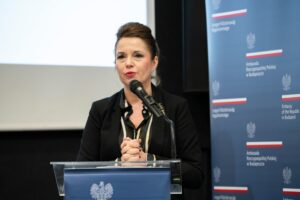 g a strong cultural attachment to the EU in Central and Eastern Europe (CEE). She emphasized the need for a Master’s program in European Studies in Hungary, which is currently non-existent, to produce senior staff for EU institutions and the importance of fostering a pro-EU citizenry. Professor Koller also highlighted the challenges in EU-related education, including the lack of research institutions and limited collaboration with the European University Institute, which Hungary has not joined yet. She called for the promotion of critical thinking and networking within the field.
g a strong cultural attachment to the EU in Central and Eastern Europe (CEE). She emphasized the need for a Master’s program in European Studies in Hungary, which is currently non-existent, to produce senior staff for EU institutions and the importance of fostering a pro-EU citizenry. Professor Koller also highlighted the challenges in EU-related education, including the lack of research institutions and limited collaboration with the European University Institute, which Hungary has not joined yet. She called for the promotion of critical thinking and networking within the field.
Prof. Krzysztof Koźbiał, Vice-Dean of the Faculty of International and Political Studies, Jagiellonian University, Cracow and Dr Mirosław Natanek, former Director of the Institute of European Studies, Jagiellonian University discussed the history and current state of European Studies in Poland. They noted that such studies have been part of Poland’s strategy since before 2004, with interdisciplinary programs including language requirements and internships. Despite challenges such as large class sizes and demographic shifts, Poland’s programs remain a key source of EU-related expertise. The country also offers several joint-degree programs with international universities, although recent changes, like the discontinuation of programs with Vienna and Kobe, have affected cooperation.
Both speakers noted that the current restriction on Hungarian universities to join Erasmus+ programs seriously hinders cooperation.
János Bóka, Minister of European Affairs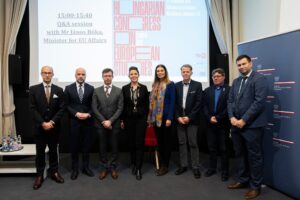 discussed the political context of Hungary’s presidency, emphasizing the slow pace of EU reforms and the need for a change in the institutions, triggered by the results of the European election in June 2024. He stressed the importance of competitiveness and enlargement in the EU’s agenda. Bóka also highlighted Hungary’s position on European security, advocating for a redesign of the EU’s security architecture and better cooperation with NATO. He mentioned the importance of energy security and Hungary’s opposition to fiscal federalism, particularly concerning the EU’s budget and debts.
discussed the political context of Hungary’s presidency, emphasizing the slow pace of EU reforms and the need for a change in the institutions, triggered by the results of the European election in June 2024. He stressed the importance of competitiveness and enlargement in the EU’s agenda. Bóka also highlighted Hungary’s position on European security, advocating for a redesign of the EU’s security architecture and better cooperation with NATO. He mentioned the importance of energy security and Hungary’s opposition to fiscal federalism, particularly concerning the EU’s budget and debts.
In the workshops, facilitated by experts, participants discussed differences and similarities between the Polish and Hungarian positions. The discussion aimed to identify points of convergence and future cooperation.
Security Working Group
Background
Security has become a dominant priority for the EU and its Member States, driven by the Russian aggression against Ukraine, which has sharpened the focus on military readiness, energy independence, and strategic autonomy. This has amplified Central and Eastern Europe’s role in shaping EU security policies, with Poland and Hungary exemplifying contrasting approaches. While Poland is one of Ukraine’s strongest supporters, contributing significantly to military aid and hosting refugees, Hungary maintains a lenient stance towards Russia, opposing military assistance and emphasizing diplomacy. Despite their divergent perspectives, both countries recognize the importance of strengthening European defence capabilities. Upcoming EU presidencies could serve as a platform for aligning interests on security and defence innovation within the EU and NATO frameworks, potentially bridging their differences.
To address the evolving security landscape effectively, it is recommended that Poland and Hungary prioritize areas of common ground while acknowledging and managing their differences. Poland’s strong perception of Russia as a major threat positions it to continue projecting itself as a critical international player through robust military investment and leveraging its geographical role in logistical support. Hungary, with its focus on fostering EU defence innovation, can complement this by championing cooperation in defence technology development, particularly in niche fields such as drones. Both nations should jointly invest in the development of critical infrastructure networks to strengthen strategic connectivity across the EU. Furthermore, enhancing resilience and civil defence measures is essential to ensure preparedness for future security challenges. By aligning their priorities in these areas, Poland and Hungary can collaboratively contribute to a more integrated and capable European security framework.
Migration Working Group
Background
The faile d policies that were created by the EU following the 2015 refugee crisis exposed significant challenges in Europe’s approach to migration, revealing the limits of one-size-fits-all policies. While protecting cultural and national identities should remain a priority, the complexity of migration flows—encompassing both regular and irregular migration—demands nuanced solutions. The ongoing debate around the “first safe country” principle highlights the need for fairer burden-sharing across EU Member States. Safeguarding borders remains fundamental to security, but economic migration policies should reflect the labour needs of individual countries, enabling them to attract skilled workers while preserving their cultural fabric. National efforts to manage migration must be supported, especially when funded domestically, to ensure sustainable and humane approaches to these growing challenges.
d policies that were created by the EU following the 2015 refugee crisis exposed significant challenges in Europe’s approach to migration, revealing the limits of one-size-fits-all policies. While protecting cultural and national identities should remain a priority, the complexity of migration flows—encompassing both regular and irregular migration—demands nuanced solutions. The ongoing debate around the “first safe country” principle highlights the need for fairer burden-sharing across EU Member States. Safeguarding borders remains fundamental to security, but economic migration policies should reflect the labour needs of individual countries, enabling them to attract skilled workers while preserving their cultural fabric. National efforts to manage migration must be supported, especially when funded domestically, to ensure sustainable and humane approaches to these growing challenges.
Group findings
To address migration challenges effectively, the group agreed on the need for “controlled migration”. Increased EU financial support is needed for an effective control of the EU borders and the burden cannot be left only on front countries. The prerequisites of asylum need to be redefined as the UN definition was born in a completely different global situation. A consensus has emerged that Europe needs regular migration due to its demographic decline, but it should be up to the member states to decide what kind of skilled labour they need. There is also a shared interest in controlling irregular migration at its source, with transparency of EU funds in third countries to be increased. Human rights need to be respected both in third countries benefitting from EU funds and at EU borders.
Germany Working Group
Background
Central European countries like Poland and Hungary navigate a complex relations hip with Germany, balancing between “too much” and “too little” involvement. Poland seeks stronger German military support for Ukraine, including advanced weaponry, while Hungary criticizes Berlin’s proactive stance on the conflict. Economically, Germany is crucial for both nations, especially Hungary, whose economy heavily relies on German trade and investment. Despite robust economic ties, political relations have soured, with Poland pushing for historical reparations and Hungary resisting Germany’s stance on China and migration. Germany’s internal political fragmentation has also weakened its leadership in European affairs, further complicating regional dynamics.
hip with Germany, balancing between “too much” and “too little” involvement. Poland seeks stronger German military support for Ukraine, including advanced weaponry, while Hungary criticizes Berlin’s proactive stance on the conflict. Economically, Germany is crucial for both nations, especially Hungary, whose economy heavily relies on German trade and investment. Despite robust economic ties, political relations have soured, with Poland pushing for historical reparations and Hungary resisting Germany’s stance on China and migration. Germany’s internal political fragmentation has also weakened its leadership in European affairs, further complicating regional dynamics.
Group findings
Relations with Germany were discussed by the group in three sub-categories (Ukraine, EU and migration). Opinions differed on the future of Ukraine and Germany’s responsibility and willingness to support Ukraine. As a possible joint project, Germany, Hungary and Poland could invest in drone technologies to improve security in the region. Cyber security could also be an area of cooperation between the three countries to enhance security in the region. On EU issues, Poland and Hungary share a common interest in increasing funding for the CAP and maintaining cohesion policy in the next EU budget, which is currently under discussion. The group also agreed on the need to financially support countries that protect the EU’s borders and create external hotspots.
Energy Working Group
Background
The E uropean Union aims to create a unified energy market to enhance security and reduce costs, with cross-border infrastructure as a key focus. Poland has made strides in diversification through projects like the Świnoujście LNG terminal and Baltic Pipe, while Hungary remains reliant on Russian energy, supported by exemptions from EU sanctions. Both countries embrace nuclear energy for decarbonization, with Poland collaborating with U.S. and South Korean firms on new plants, while Hungary expands its Russian-built Paks facility. The energy transition poses challenges: Poland grapples with coal dependency in regions like Silesia, aided by EU funds, whereas Hungary must tackle energy poverty and equitable access to green energy. These dynamics raise questions about the EU’s ability to balance diverse national strategies and achieve energy unity.
uropean Union aims to create a unified energy market to enhance security and reduce costs, with cross-border infrastructure as a key focus. Poland has made strides in diversification through projects like the Świnoujście LNG terminal and Baltic Pipe, while Hungary remains reliant on Russian energy, supported by exemptions from EU sanctions. Both countries embrace nuclear energy for decarbonization, with Poland collaborating with U.S. and South Korean firms on new plants, while Hungary expands its Russian-built Paks facility. The energy transition poses challenges: Poland grapples with coal dependency in regions like Silesia, aided by EU funds, whereas Hungary must tackle energy poverty and equitable access to green energy. These dynamics raise questions about the EU’s ability to balance diverse national strategies and achieve energy unity.
Group findings
While they choose different partners for major developments, nuclear-energy-related projects could be one of the key fields of cooperation among the two countries. They have a vital interest in lobbying for funding related to nuclear developments in fields such as research or education. They are also both interested in nuclear energy as a tool for the green transition and to obtain subsidies for certain investment elements. The two countries are interested in expanding their energy network, and in the case of natural gas, in expanding the capacity of interconnectors. Negotiations should be pursued to increase the role of Polish LNG in Hungary’s energy diversification. To reduce the risk of possible sanctions against China, the two countries need to work together and lobby for EU funding to create an industrial base in areas such as solar panel production.


